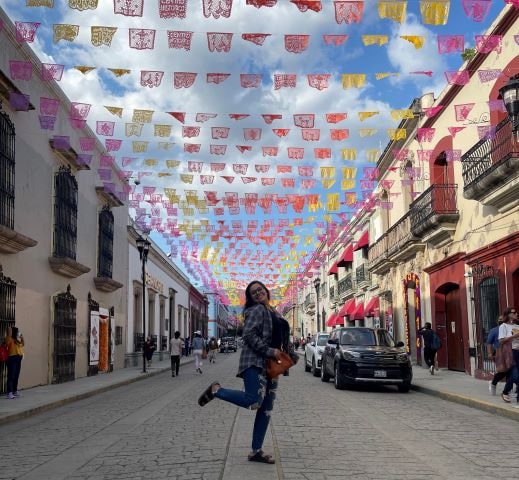Blogs

International Women's Day 2022: Isabel Zavala
Isabel Zavala is a senior at the University of Dayton majoring in Human Rights and Spanish, and minoring in Latin American Studies and International Business Management. She also works as World Ambassador (WA) for the Education Abroad Office in the Center for International Programs.
What is your concept of ‘home’ and how do you understand it today?
As a Mexican-American, I found it difficult at a young age to find home in the United States or in Mexico. I was not Mexican enough for Mexicans, and because of my skin color and appearance I was seen as an “other” in the United States. All of this pushed me towards a global approach where I had to create my own home and sense of belonging based upon my values and experiences. Being caught between two cultures taught me to become a global citizen. I eventually acquired my Mexican citizenship, studied abroad in Merida, Mexico, and explored various dimensions of my heritage more freely and comfortably. I learned to explore Mexico’s rich cultures and not worry as much about how I was perceived as a Mexican-American.
However, traveling to Mexico as a child, even when I did not feel as comfortable, taught me a great deal and solidified my values and life mission. I remember seeing young children working during the daytime, selling wares and sweets instead of going to school. Because they’re cute and innocent-looking, children in Mexico are often thought to be better sellers of goods on the streets or in the markets. I also saw a man hiding, following one of the children. This I will never forget. At first, I wasn’t sure what was happening. But then it hit me: the man was probably his father making sure the child was working and selling the goods he wanted the child to be selling. This hurt me to my core and drove me to my major in Human Rights with a focus on the rights of children. What I saw in Mexico was clearly driven by a lack of options and economic insecurity. Without addressing these larger structural issues, child labor is unlikely to end in Mexico and elsewhere.
As a UD student, what are key takeaways of global learning you have learned? What do you wish to learn more about? What have you yet to learn?
I have learned so much at UD about the world and some different cultures, that it would be hard to know where to start. However, my favorite class of all time was ANTHRO 325, “The Anthropology of Human Rights,” with Dr. Miranda Hallett. In this class, in addition to learning about immigration, we had a practicum in El Salvador. In El Salvador, my vantage point for understanding the country had been mostly negative, focused on violence, police brutality and poverty. What I learned from young Salvadorans was that despite living in an environment of daily violence, criminalization by police and being “guilty by association” with the M13 gangs whether or not they were a part of them (often the gangs tried to recruit them), there were many beautiful aspects to their lives. They spoke with great joy about the beaches, school life and music they loved and didn’t see themselves as victims. They were much more than headlines. The trip there changed my perspective and thought process in my studies and future career goals.
I have also learned about the challenges of being a woman while traveling and about different experiences of womanhood across borders. As a woman, I have had to be more cautious and vigilant traveling than my male counterparts. I cannot go out alone late at night, for example, without risking harassment and violence, and some male friends have had to be educated to understand this. But I also learned in classes and in my travels to Turkey about Muslim women and hijab. We read Do Muslim Women Need Saving? by anthropologist Lila Abu-Lughod and it changed my perspective as well. Women don hijab for many reasons and may make decisions those of us in the West do not understand. What I have learned is that as long as women are choosing their clothing, religion and so on, we must support women’s decisions. There are many different signs of empowerment and a great diversity of women’s experiences.
While how someone dresses never ever justifies physical violence or harassment, when I traveled to Turkey, my mother and I had to learn to wear more conservative clothing as a sign of respect for the local culture. I have yet to really learn as much as I would like, and to truly grasp the implications of understanding Western privilege and the difficulties of ascribing to Western ideology in a world where the majority of people are not from a Western background. I never intend to stop learning, and never intend to stop exploring the world and traveling. Hopefully by this kind of engagement, I will continue to grow in my understanding of many corners of the globe.
